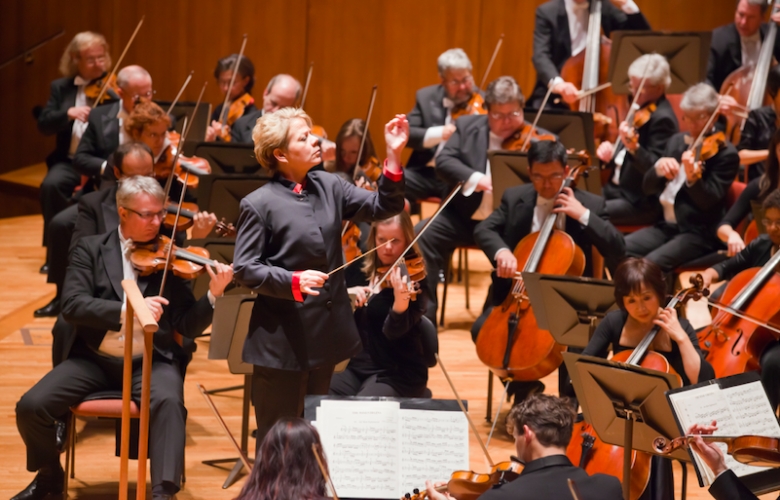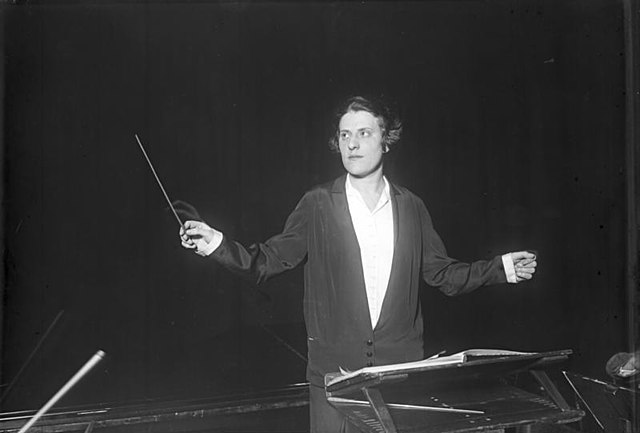
The iconic scene of a woman bringing a chair in the middle of a concert to watch and learn the conducting of an orchestra by a famous male conductor, and then being expelled from the place, showed me how bravely this woman tried to pursue her dream. This scene could be from a movie today, but it happened almost 100 years ago, in 1926, in New York, and the woman portrayed was Antonia Brico in her biographical film “The Conductor” (2018), which I highly recommend.
Antonia Brico was one of the world’s first female conductors, and throughout her career, she faced significant discrimination and obstacles because of her gender. Born in the Netherlands in 1902, she immigrated to California with her foster parents in 1908, where she showed an early talent for music and began studying piano at an early age.
One of her greatest contributions to the fight for gender equality was the founding of the Women’s Symphony Orchestra in New York in 1934 to demonstrate that women could play in any category. The orchestra’s success attracted the support of Eleanor Roosevelt, the First Lady of the United States at the time.

She conducted several prestigious orchestras in the United States and Europe, but despite all her efforts and recognition by other means, she was never the principal conductor of any of them, one of the greatest disappointments of her life.
Decades after Brico’s breakthrough in gender equality, women are still underrepresented in conducting and composing roles and often face barriers and discrimination in their careers.
In recent years, organizations and initiatives have been established to support and promote female conductors, such as the Women’s Philharmonic. Women still make up less than 10% of conductors worldwide. One such renowned conductor is Marin Alsop, who in 2013 became the first woman to conduct the Last Night of the Proms in the United Kingdom. It was after attending one of the famous Leonard Bernstein concerts, Young People’s Concerts, with her father, that she began to develop her interest in conducting. Alsop has spoken about the challenges she has faced as a female conductor, including the need to prove herself more than her male counterparts. In 2021 her story was told in a documentary also called “The Conductor” (2021).
The legacies of Antonia Brico and Marin Alsop, along with other pioneering women in classical music, serve as a source of inspiration and motivation for those who seek to break down barriers and promote greater diversity and inclusion in the music industry.
Through their talent, dedication, and perseverance, non-male conductors are changing the face of classical music and paving the way for future generations of anyone following their dreams.
So, if you want to make a difference in the music or audio industry, remember to get your chair and find your place in the crowd so you can be heard.
The Groundbreaking Feminine Power of Rock Icon Stevie Nicks


The mission of SoundGirls.org is to inspire and empower the next generation of women in audio. Our mission is to create a supportive community for women in audio and music production, providing the tools, knowledge, and support to further their careers. SoundGirls.Org was formed in 2013 by veteran live sound engineers Karrie Keyes and Michelle Sabolchick Pettinato and operates under the Fiscal Sponsorship of The California Women’s Music Festival, a 501(c)3 non-profit organization. In 2012, Karrie and Michelle participated in the “Women of Professional Concert Sound” panel at the AES Conference in San Francisco. The panel was hosted by the Women’s Audio Mission (WAM) and moderated by WAM founder Terri Winston. Terri brought together five women working in live and broadcast audio. The groundbreaking panel (which also included Jeri Palumbo, Claudia Engelhart and Deanne Franklin), provided young women and men a glimpse into life on the road, tips and advice, and a Q & A with the panelists. More importantly though, was how incredibly powerful the experience was for the panelists. We had all been in the business for 20 years or more, yet most of us had never met before that day and within minutes we bonded like long-lost sisters. We were struck by how similar our experiences, work ethics, and passions were and wondered why our paths had never crossed and how our careers would have been different had we been there to support each other through the years. Each of us are strong on our own, but together we were even stronger and a powerful force. We were empowered. Each of us had been asked hundreds of times in our careers: Are there other women doing sound? How did you get into sound? How would a young woman go about getting into sound? Through creating SoundGirls.Org, we hope to establish a place for women working in professional audio to come for support and advice, to share our success and failures, our joys and frustrations, and for empowerment and inspiration.
Read Full Profile© 2021 TheatreArtLife. All rights reserved.

Thank you so much for reading, but you have now reached your free article limit for this month.
Our contributors are currently writing more articles for you to enjoy.
To keep reading, all you have to do is become a subscriber and then you can read unlimited articles anytime.
Your investment will help us continue to ignite connections across the globe in live entertainment and build this community for industry professionals.